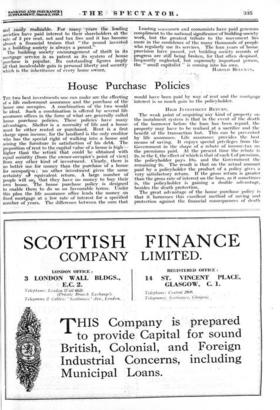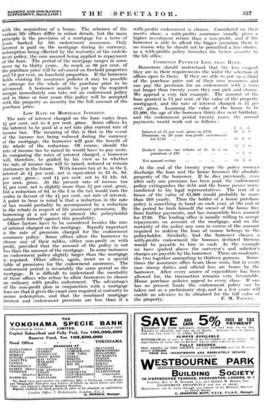House Purchase Policies
TfIE two best investments one can make are the effecting of a life endowment assurance and the purchase of the one occupies. A combination of the two would - be ideal. Such a combination is offered by several life assurance offices in the form of what are generally called house purchase policies. These policies have many advantages. Shelter is a necessity of life and a house must be .either rented or purchased. Rent is a fix* charge upon income, for the landlord is the only creditor who has the special right of walking into a house and seizing the furniture in satisfaction of his debt. The proportion of rent to the capital value of a house is high— higher than- the - reffirif that could 'be Obtained with equal security (from the owner-occupier's point of view) from any other kind of investment. ' Clearly,. there is no better use for -minty than the purchase of a honse for occupatinn; ' nn Other investment gives the same' certainty oP equivalent return. A large number of people will sk,. that they have no money to buy, their own house., The , house purchase _policy ., is designed to enable them to do so on favourable terms. Under this plan the life assurance office lends the money on -fixed mortgage at a -low rate of interest for a specified -number of years. The difference between the sum that would have been paid by way of rent and the mortgage • interest is so much gain to the policyholder.
HIGH INVESTMENT RETURN.
The weak point -of aequiringany kind of property on the instalment system is that in the event of the death of the borrower before the loan has been repaid, the property may have to be realised at a sacrifice and the benefit of the transaction lost. This can be prevented by life assurance. Life assurance provides the best means of saving. It enjoys special privileges from the Government in the shape of a rebate of income-tax on the premiums paid. At the present time the rebate is 2s. in the the effect of which is that of each £ of premium, the policyholder pays 18s. and the Government the remaining 2s. The result is that- on the' actual amount paid by a policyholder the product of a policy gives a very satisfactory return. If the gross-return is greater than the gross rate of interest on the loan, as it sometimes is, the policyholder is gaining a double advantage, besides the death protection.
The great advantage of • the house purchase policy is that it harnesses this excellent method of saving and protection against the financial consequences of death with the acquisition of a house. The schemes of the variourS-life offices' differ in minor details, but the main principle is the provision of a mortgage for a term-of years backed by life endowment assurance. Only interest is paid op the mortgage; during its currency, redemption being effected by the maturity of the endow- ment policy, the sum assured being applied in repayment of the loan. The period of the mortgage ranges in some cases up to thirty years. As much as 80 per cent. of the purchase price will be advanced on freehold properties and 75 per cent. on leasehold properties. If the borrower holds existing life assurance policies it may be possible to arrange for the whole of the purchase price to be advanced. A borrower unable to put up the required margin immediately can take out an endowment policy and in three or four years this policy will be accepted with the property as security for the full amount of the purchase price.
LOW RATE OF MORTGAGE INTEREST.
The rate of interest charged on the loan varies from 4i per cent. net to 6 per cent. gross. Some offices fix the interest to be paid at a net rate plus current rate of income tax. The meaning of this is that in the event of the income tax being reduced during the currency• of the mortgage, the borroWer will gain the benefit of the whole of the reduction. Of course, should the rate of income tax be raised he would have to pay more. In comparing the rates of interest charged, a borrower will, therefore, be guided by his view as to whether the rate of income tax will be raised, reduced or remain stationary in the future. With income tax at 4s. in the £, interest at 41 per cent. net is equivalent to £5 6s. 3d. per cent. gross ; and 41 per cent. net to £5 12s. 6d. per cent. gross. At the present rate of income tax 44 per cent. net is slightly more than 51 per cent. grois, but a reduction of 6d. in the £ in the tax would turn the scales in favour of the 41 per cent. net rate of interest. A point to bear in mind is that a reduction in the rate of tax would probably be accompanied by a reduction in the rebate in respect of life assurance premiums. By borrowing at a net rate of interest the policyholder safeguards himself against this possibility. Other factors have to be considered besides the rate of interest charged on the mortgage. Equally important is the rate of premium charged for the endowment assurance policy. Some offices allow the borrower to choose any of their tables, either non-profit or with profit, provided that the amount of the policy is not less than the amount of the mortgage. In some instances an endowment policy slightly larger than the mortgage is required. Other offices, again, insist on a special table of premiums for the endowment assurance. The endowment period is invariably the same period as the mortgage. It is difficult to understand the mentality of those offices who refuse to allow borrowers to choose an ordinary with profits endowment. The advantages of the non-profit plan in conjunction with a mortgage loan are that it gives the exactsiun required at maturity to secure redemption, and that the combined mortgage interest and endowment premium are less than if a with-profits endowment is chosen. Considered on their merits alone, a with-profits assurance usually gives a higher investment return than a non-profit, and if the borrower is able to afford the bigger premium there is no reason why he should not he permitted- a free choice, as a with-profits policy furnishes the better security to the life office.
COMBINED PAYMENT LESS THAN RENT.
Borrowers should understand that the less exigent they are in their- requirements the wider the selection of offices open to them. If they arc able to put up a third of the purchase price out of their own resources and can pay the premium for an endowment with a term not longer than twenty years they can pick and choose. We append a very fair example. The amount of the loan granted is 75 per cent. of the value of the property mortgaged, and the rate of interest charged is 51 per cent. gross. Assuming the value of the house to be £1,000, the age of the borrower thirty-five next birthday, and the endowment period twenty years, the annual payments would work out as follows : £ s. d.
Interest at 51 per cent. gross on £750
41 5 0 Premium on 20 year non-profit endowment, for £750 .
:it
0
it)
74
5 0
Deduct income tax rebate at 2s. in on
premium of £31 ..
3 2 0 Net annual outlay
69 3 0
At the end of the twenty years the policy moneys discharge the loan and the house becomes the absolute property of the borrower. If he dies previously, even after only one premium has been paid, the endowment policy extinguishes the debt and the house passes unen- cumbered to his legal representatives. The rent of a house of the value of £1,000 would probably be more than £69 yearly. Thus the holder of a house purchase policy is something in hand on each year, at the end of the period he finds himself the owner of the house free from further payments, and has meanwhile been assured for £750. The lending office is usually willing to accept repayments on account of the mortgage, and on the maturity of the policy any sum in excess of the amount required to redeem the loan of course belongs to the policyholder. Similarly, had the borrower chosen a with-profits endowment the bonuses declared thereon would be payable to him in cash. In the example we have quoted above the surveyor's and solicitor's charges are payable by the borrower. These are moderate, the two together amounting to thirteen guineas. Some- times the assurance office bears these costs, but in every case stamp duties and official fees are borne by the borrower. After every source of expenditure has been allowed for, the transaction remains very favourable. House purchase policies appeal to every class. If one has no present funds the endowment policy can be taken out as a preliminary step, and in a few years will enable an advance to be obtained for the full value of

























































 Previous page
Previous page